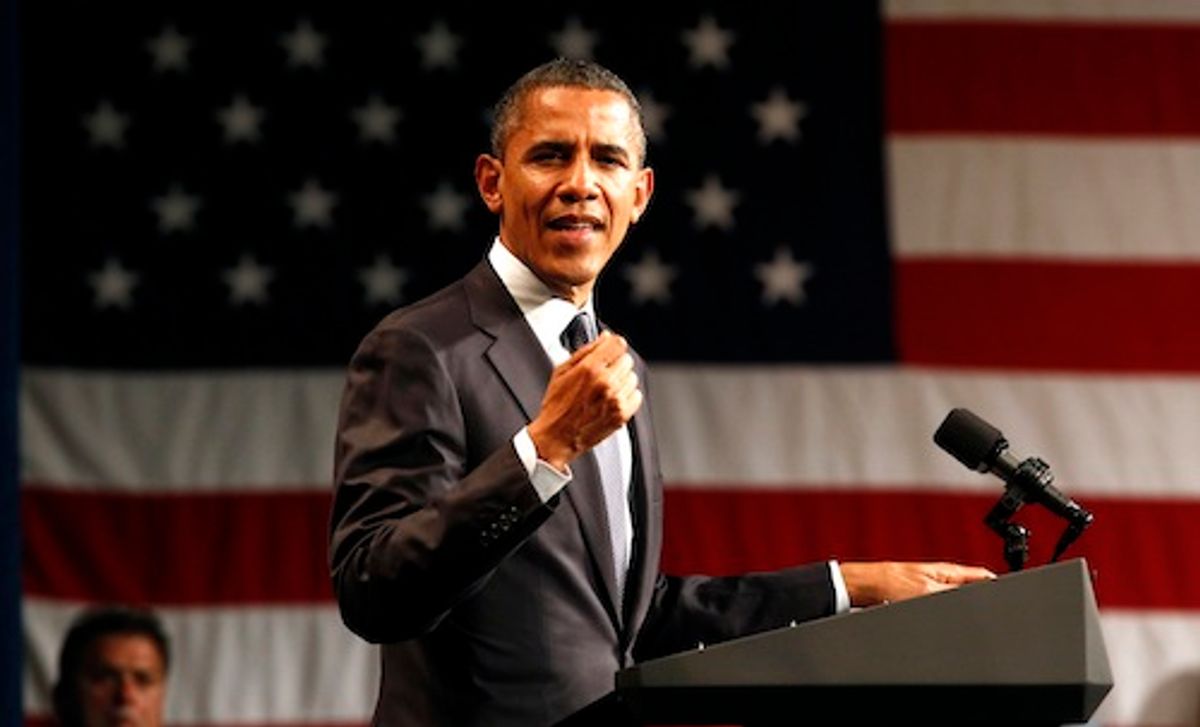I count myself as a supporter of President Obama who reserves the right to criticize him when I disagree. And I disagreed with his reluctance to come out in support of gay marriage for a long time. I'm also on record wishing he'd taken a stronger public stance behind several big progressive priorities -- a larger stimulus, tougher Wall Street reform, a public option for health insurance, a big jobs bill – whether or not he had the congressional support to make it happen.
Throughout the president's first term, his most ardent supporters have reacted to those of us pushing him to do – and say – more on such issues with frustration and anger, some of it nasty and personal, some of it thoughtful and well-argued. They rightly blame Congress for blocking action on key progressive priorities, but strangely downplay the power of presidential leadership. Late last year, New York magazine's Jonathan Chait twice attacked liberal Obama critics for being "unreasonable" about what the president alone could accomplish, because "liberals, on the whole, are incapable of feeling satisfied with a Democratic president."
Chait took particular aim at lefty image guru Drew Westen, a one-time Obama admirer who criticized the president in the New York Times not merely for what he hadn't accomplished, but for failing to tell a compelling story. Chait accused Westen and other progressives of embracing:
…a model of American politics in which the president in not only the most important figure, but his most powerful weapon is rhetoric. The argument appears calculated to infuriate anybody with a passing familiarity with the basics of political science. In Westen’s telling, every known impediment to legislative progress — special interest lobbying, the filibuster, macroeconomic conditions, not to mention certain settled beliefs of public opinion — are but tiny stick huts trembling in the face of the atomic bomb of the presidential speech. The impediment to an era of total an uncompromising liberal success is Obama’s failure to properly deploy this awesome weapon.
Chait caricatured Westen's argument (and the beliefs of those who agreed with it), but he got lots of love for both pieces in the pro-Obama blogosphere, where folks finally felt they had a real diagnosis for the illness of those they dismissed as "emoprogs." But now that we see the changes wrought by Obama's politically risky embrace of gay marriage, maybe it will be easier for folks to understand that it's the job of political advocates not merely to praise, but to push their leaders forward.
Steve Kornacki runs down the astonishing political changes we've seen in the mere two weeks since the president carefully announced his supposed change of heart on gay marriage. The nation's largest African-American organization, the NAACP, has come out behind it – and maybe most important, recognized it as an important civil rights issue. Maybe most dramatic, in Maryland, African-American voters have now flipped to support the state's gay marriage ballot measure 55 to 36 percent –almost the exact percentage by which they opposed it in previous polling on the state issue. And in the latest ABC News/Washington Post poll, African-Americans' support for gay marriage jumped to 59 percent from 41 percent in the wake of the president's historic announcement.
Now, I'm not going to argue that Obama's turnaround alone caused this sea change. The arc of the moral universe has been bending toward justice on gay rights for a long time, and as I wrote last week, the president gave it an additional tug. There have been advocates within the NAACP working to make this happen for a long time, and they deserve a lot of credit. African-American voter opinion had already been trending in this direction, even if black voters had been less receptive to gay marriage than other demographic groups. There is also an emotional and personal component to the president's stance that makes his moral suasion hard to replicate on behalf of, say, the jobs bill or the public option. (And let's also remember it's white voters who are most hostile on some of those economic issues, thanks to the divide and conquer politics of the GOP over the last 40 years.)
Still, it's hard not to conclude that Obama's words made a significant difference in the political course of this debate. Ironically, it was once critics of Obama who mocked the power of words, and specifically the candidate's own oratorical gifts. Obama shot back at them many times.
"Don’t tell me words don’t matter," he told Wisconsin Democrats in February 2008. "'I have a dream’ — just words. ‘We hold these truths to be self-evident, that all men are created equal’ — just words. ‘We have nothing to fear but fear itself’ – just words. Just speeches." At many times over the last three years, I've been amazed at how Obama's critics and supporters seemed to change sides on the question of the power of his words.
I give the folks who call themselves "prag progs" – pragmatic progressives, as opposed to "unreasonable" emoprogs – a lot of credit for fixing attention on what the president has accomplished, and reminding others not merely to fixate on what he hasn't. But I think it's time that all of us acknowledge that there's a role for constructive pressure, too. Progressive change has always required impatient agitators – and it will continue to.



Shares